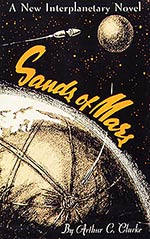
![]() Naomi_uk72
Naomi_uk72
2/3/2019
![]()
Before I get into the meat of my review let me get one thing out of the way right now. This book is almost seventy years old, written before we had any real understanding of what Mars was like. We hadn't even managed to get anything into orbit when this book first came out, so there's bound to be a bit of a separation between the science and technology we know now and what this book asserts. Got that? Good.
The story follows the adventures of sci-fi writer Martin Gibson as he becomes the first tourist to visit Mars. The book is essentially in two halves; the first half tells us about the journey itself aboard the liner Ares, while the second half deals with Gibson's time on Mars and what he finds there. At its core, this is a story of exploration, but as with so much of Clarke's work there are multiple layers to the narrative, and also in common with what I've read of Clarke's work to date this is one hell of a readable story.
With the first half being set on the liner Ares we get to learn a lot about the operation of the ship and her crew. Even with a limited knowledge of spaceflight and interplanetary travel Clarke is able to present a believable and enlightening narrative, which can be a little dry at times but rarely fails to entertain. We're amused by Gibson's first experience of low gravity and freefall, as well as his initial bout of space sickness; we're presented with an awe-inspiring description of the galaxy free of the haze of an atmosphere; we get to share Gibson's first (and only) spacewalk, albeit in a suit that never was. This is Clarke in his element, taking the technical aspects of what was known about space travel at the time and turning them into a fun, enticing story that makes it sound oh so easy.
The second half brings us to Mars, via a brief stop-off at Deimos, and it isn't long before the tone of the story changes. Instead of being an exploration of space travel we're now presented with a frontier tale coupled with a subtle, almost invisible, detective story. The colonists of Mars are up to something, keeping secrets, but Gibson doesn't seem all that driven to find out what. Instead, he seems more interested in discovering Mars for himself, trying to get to grips with the colonist spirit. Here Mars is shown to be an inhospitable wasteland with a poisonous CO2 rich atmosphere. The colonists, for the most part, live under domes in the capital city of Port Lowell. There's a brief exploration of the plant life native to the red planet but mainly the second half focuses on the interaction between the various characters and how they deal with the dangers around them.
As I mentioned at the top of this review, there's a lot that Clarke gets wrong in here, science and tech wise, but that's okay because this is great book despite that. Yes, it is representative of its time, particularly where gender roles seem to be concerned - the very few female characters mentioned are there as props for the male characters to interact with, while all the important jobs are undertaken by men - but it still has a lot to say about human ingenuity. This is typically optimistic fare from Clarke, and one of those books I'd say anyone genuinely interested in the history of sci-fi should add to their reading list.
There's a reason Clarke is considered one of the Grand Masters of science fiction, and this, his first full length novel, goes a long way to show us what that reason is.